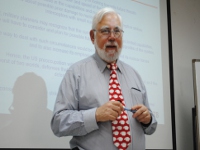Registration
Thank you!
You will receive an email confirming your registration.
IMGXYZ3483IMGZYXAt a Tsinghua University discussion sponsored by the Carnegie-Tsinghua Center for Global Policy, Dr. Theodore Postol of the Massachusetts Institute of Technology gave a presentation on the state of the U.S. missile defense system. Carnegie’s Paul Haenle moderated the event.
- Unreliable Technology: Postol argued that current missile defense technology is not reliable. Missile defense systems are easily fooled by crude tactics such as employing balloons in space or launching multiple decoy missiles to accompany the actual targeting missile.
- Domestic Politics: The implementation of a U.S. missile defense system has largely become a domestic political topic rather than a substantive foreign policy issue in the United States, Postol added. Some members of the U.S. Republican party use this issue to portray their Democratic opponents as not taking homeland security seriously.
- Unbalanced Global Power: Postol concluded that a missile defense system would skew the global balance of power, encouraging nations outside of the missile defense umbrella to feel more frightened and unprotected. As a result, he stated, the missile defense system would perpetuate an arms race, not help promote nuclear deterrence.
